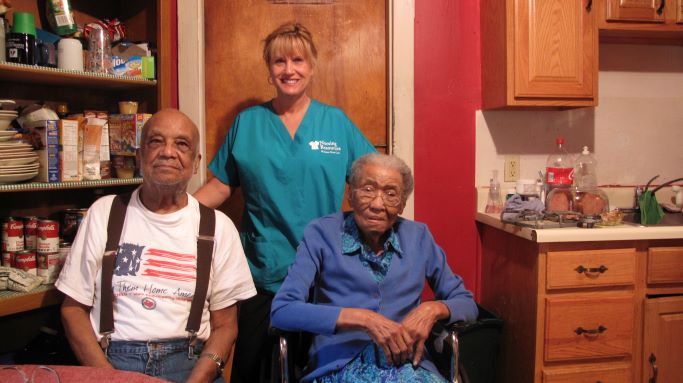
When 104-year-old Stella Bailey died Oct. 9, she was exactly where she wanted to be — at her Rossford home of 90 years, with her husband and family close by.
“She didn’t suffer none. That’s the good part,” said 96-year-old Jay Bailey, Stella’s husband of 60 years.
Family members had visited just before she died, Jay said.
“She was laughing and joking with the little baby,” he said. “She lived a ripe old age.”
Stella was able to remain at home with the help of PASSPORT, a state Medicaid waiver program funded through the Ohio Department of Aging and the Ohio Department of Job and Family Services.
The program, administered in Northwest Ohio by the Area Office on Aging of Northwestern Ohio (AOoA), links Medicaid-eligible seniors with long-term care services, such as home health aides, home-delivered meals, medical equipment, medical transportation, adult day care and more.
PASSPORT services usually supplement care provided by family members, said Pam Wilson, AOoA’s vice president of long-term care.
“Many of the people we serve do have families who are dedicated to keeping them at home and are actively participating and assisting with the care,” Wilson said. “Our services wrap around that family unit and provide support in places where the family may be struggling.”
Stella started using PASSPORT in 2003. Home health aides assisted Jay in caring for Stella seven hours a day, seven days a week.
“She’s been real good,” Jay said of primary aide Lori Kott of Maumee-based Nursing Resources. “I wouldn’t have made it without her.”
Most older adults prefer to stay home as long as possible, Wilson said.
The PASSPORT program helped 104-year-old Stella Bailey stay at home until she died. Also pictured is her husband, Jay Bailey, and home health aide Lori Kott.
“It’s often where they’ve lived for many years and a place where they are comfortable and want to stay,” Wilson said. “Being in the home lets you feel more a part of your family and a part of your community. It’s just that familiarity. Every time someone makes a physical move, it’s disruptive to the person, it’s disruptive to their health. It’s very common that people become disoriented, even though they may not have been disoriented in the past, if they end up in the hospital or they go from hospital to a nursing home. It’s trauma.”
PASSPORT also helps the health and well-being of caregivers, Wilson said.
“If you have those supports in place, families can often be caregivers for longer periods of time because they have the support and don’t burn out as they may if they were doing all the care themselves,” Wilson said. “It’s not uncommon that we hear, ‘Gosh, I wish I knew about you a couple years ago.’”
If the primary caregiver is a spouse, PASSPORT gives them more time together, Wilson said.
“A lot of times it’s stressful on the caregiver to make those regular trips to the nursing home when they want to go every day and stay for hours,” she said.
PASSPORT services are also cheaper than a nursing home, saving taxpayers money, said Justin Moor, AOoA’s vice president of planning and program development. A year of nursing home care in Ohio costs about $62,000 on average, whereas a year of PASSPORT services costs about $21,000, Moor said.
“PASSPORT is about a third of the cost to taxpayers, so for each senior that gets their care through PASSPORT, the savings to taxpayers is about $40,000 a year,” Moor said.
When PASSPORT started in July 1990, about 90 percent of Medicaid dollars for long-term care went to nursing homes and 10 percent to home care services. Today, it’s closer to 60-40, Moor said.
“It’s working well. It’s been growing every year,” Wilson said. “We do feel it’s one of those cost-saving options to help with state budget issues.”
About 2,800 Northwest Ohioans participated in PASSPORT in 2011 and the program has served more than 20,000 Northwest Ohioans since 1990, Wilson said. Statewide, more than 31,000 Ohio seniors participate in PASSPORT each year.
To qualify, applicants must be 60 or older, need help with at least two daily living activities such as bathing, dressing or walking, and meet Medicaid’s financial eligibility guidelines, which include an income of no more than $2,090 per month and no more than $1,500 in assets, not including their home.
AOoA’s nurses and social workers oversee the service plans and perform the initial eligibility assessment. The services are provided by more than 120 contracted agencies.
PASSPORT does not negate the need for nursing homes, Wilson said.
“We certainly support the need for nursing homes. We know we can’t do all the care in the community,” Wilson said. “We want people to get the care they need and nursing homes are doing a wonderful job with rehab after illnesses and surgeries, but we don’t want them to feel like they are going to be stuck there.”
Wilson said too many people don’t know about PASSPORT and the AOoA.
“Our goal is to make sure people know we’re here and not to wait to call for help,” Wilson said. “A lot of people don’t look for the kinds of services we offer until they need help and then generally they need it immediately. Having a little support in place lets us be able to add some additional supports when something happens. Whether Medicaid-eligible or not, we’re always willing to help connect people with those community resources that can help a person stay at home.”
For information, visit www.areaofficeonaging.com or 2155 Arlington Ave., or call (419) 382-0624.























